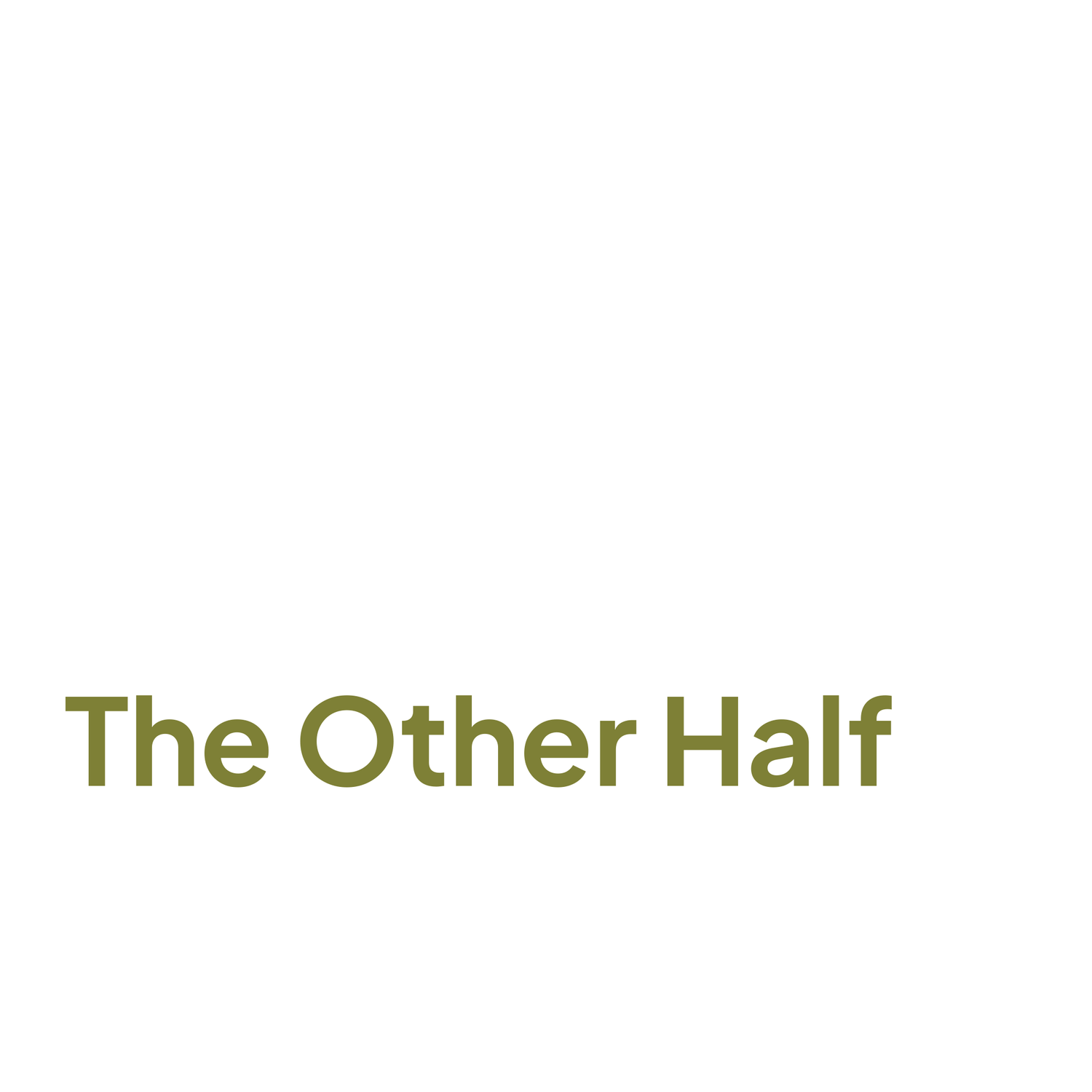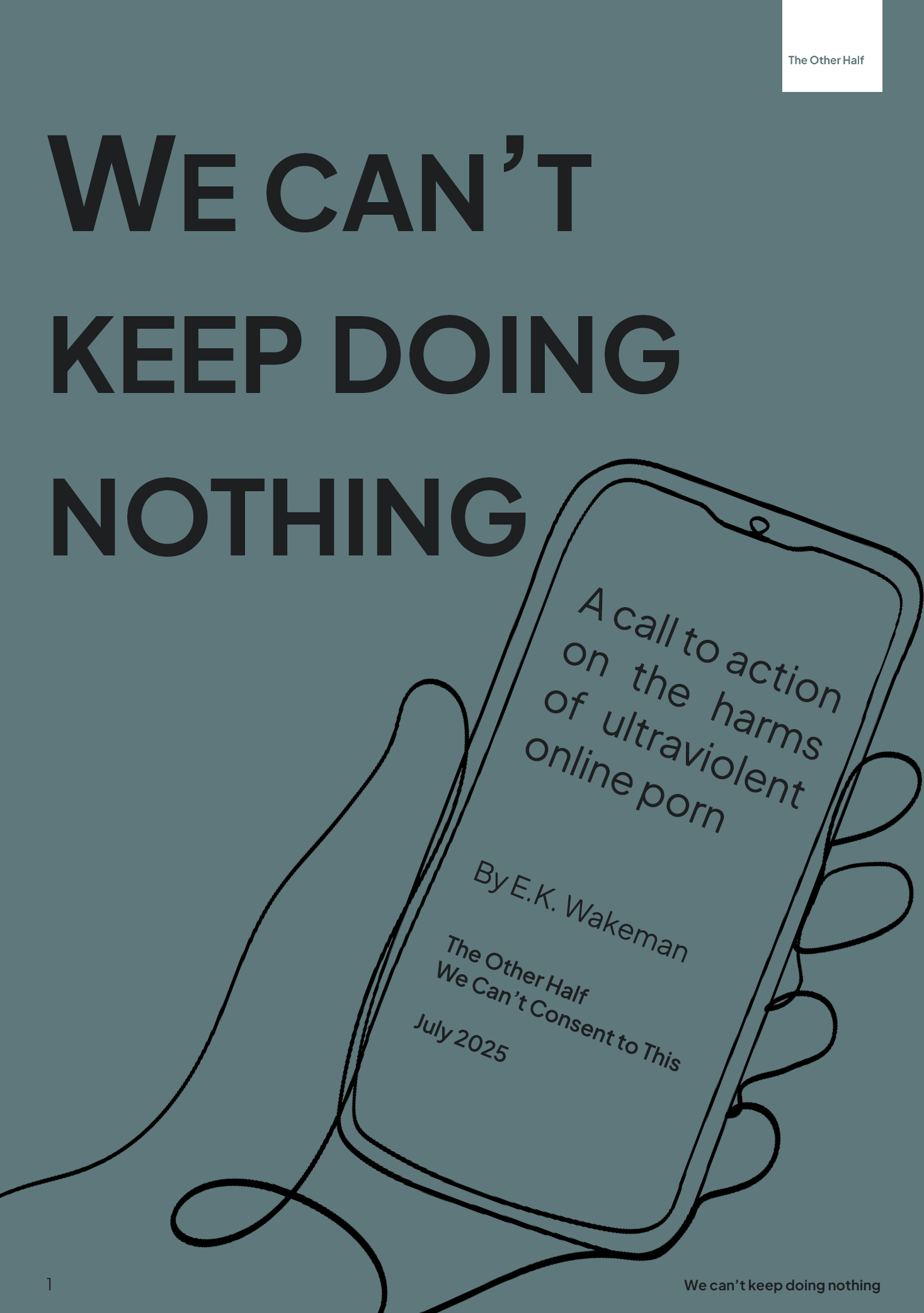7th July 2025
Research and report by E.K. Wakeman of The Other Half. Editing by Fiona Mackenzie MBE, CEO of The Other Half. Both campaigned as We Can’t Consent to This in 2019-2021 to highlight widespread strangulation in sex, the use of ’rough sex’ claims to evade justice in violent assaults and homicides, and won law change on both issues.
READ: Download report
We speak to the Guardian’s Anna Moore:
We Can’t Keep Doing Nothing
“As long as violent porn is easily accessible, women are in grave danger.”
Young British woman, who was only just born as the battle against the harms of ultraviolent internet porn began.
This is a review of the impact of ultraviolent porn and the societal and political response so far, prepared by the think tank The Other Half and the campaign We Can’t Consent to This. An earlier version of this document was prepared for the Westminster Government Independent Pornography Review in March 2024.
It features stories from 100 British people and new research, including our attempts (some failed) to battle the harms using the existing law.
For Liz, Jane, Sue, and the millions harmed.
A very brief introduction
Britain, like most developed nations, has many women reporting violence being done to them in sex. This alarm bell has been ringing for years.
The We Can’t Consent to This campaign raised this 6 years ago, and won a new strangulation offence, a small victory. But this violence did not come from the ether. Young men told us they saw this done to women in porn. Young women thought it normal mostly thanks to mainstream social media sites. These were children groomed by early exposure to extremely violent sexual content: we should view them as victims of abuse. We’ve done little to stop this. And now we have girls identifying away from their sex. Avoiding relationships. Astonishing rises in child-on-child sexual assault, our schools unsafe. Young women presenting to medics after violent sexual harm. Boys fall in with internet strongmen, exploiters of women, who make those children feel invulnerable rather than damaged.
The ringing gets louder. But it is very easy to do nothing.
The UK is the only nation to have criminalised online strangulation pornography in response to real life violence used against women. It might surprise you that we did this 19 years ago, and even then it was already a crime to publish and share it.
But this law was not used. It is no one’s job to use it. State agencies given the power to use it simply don’t want to. Despite the pleas of those who grew up exposed to ultraviolent porn in childhood, and violence in adulthood, much of British civil society does not want to believe porn brings harm. Academia has mostly turned a blind eye. Lack of research on harm gives government further excuse to do nothing. Any attempts to make change founder, as we try another round of bans, blocks, policies or frameworks again and hope it works. We should be appalled at our failure. It’s hard to imagine another industry—insurance, or ready meals— being given this much space to do this much public harm. Harm that we don’t know how to undo.
I know that parliamentarians and Ministers understand this issue, and dearly want to change this. I don’t want their efforts to fail again. This report has one main recommendation. Ministers should set up:
A taskforce including law enforcement and technology experts, reporting to ministers, empowered to implement the existing law, test where it fails, propose change. They, and government, would be accountable for these outcomes:
1. It should be rare for children to be exposed to pornography in the UK. It is not—and causes terrible harm.
2. It should be rare for adults to be delivered criminal pornography in the UK. It is not– and this harms women and men.
If you don’t believe how bad things we’ve allowed this to get, listen to the 100 British people and our research on the harms of ultraviolent online porn. We tell you honestly what we’ve tried—and often failed—to do with the existing law. But this time, we can’t keep failing. What will we choose to do? Because we can’t choose to keep doing nothing.
Fiona Mackenzie MBE
A timeline
2003 Jane Longhurst, a teacher, is murdered by her best friend’s boyfriend. He blamed Jane—claimed it was ‘rough sex’, that she’d consented to strangulation. And he had used strangulation porn, from the internet, for years, as well as in the killing of Jane.
2004 The House of Lords debates the issue of violent internet porn:
Clearly, the recent barbaric murder of Jane Longhurst has highlighted the problem of those people who not only have an appetite for watching violent pornography via the Internet but who also go on to act out their abhorrent fantasies in real life. This disturbed group of people may be, and hopefully is, relatively small in number but far too little is known about the long-term wider effects on society of indulging this kind of appetite, especially in a world where the material is all too universally available” Baroness Howe
2006 Jane’s mother Liz and sister Sue win law change at Westminster. Possession of violent ‘extreme porn’ will be banned. Liz Longhurst says:
“we have persuaded the Government to take action against these horrific internet sites”
Home Office Minister Vernon Coaker is clear that this adds to existing law, responds to the internet age, and will be enforced. “This sort of material is not just offensive, it contains images of sexual acts and sexual violence that are already illegal to publish or distribute in the UK. Such material has no place in our society but the advent of the internet has meant that this material is more easily available and means existing controls are being bypassed. We must move to tackle this.”
2008 Police say they will not proactively prosecute the new law. The Criminal Justice Act makes Liz Longhurst’s campaign reality. But it is rarely used—and never used against porn sites.
2010 First Android smartphones join Apple’s 2007 iPhone.
2011 Jane Longhurst’s mother Liz says the ban on violent online extreme porn has not worked.
2013 Children tell the Children’s Commissioner that “Basically, Porn is Everywhere”. She finds that extreme violent porn is driving risk-taking behaviours in children.
2013 Youth worker says “boys as young as 11 and 12 ask him if it’s okay to try to choke or strangle a girl while they’re having sex“
2013 Government criminalises possession of ‘rape porn’, adding to the extreme pornography laws.
2013 Government ‘digital porn block’ foiled by EU who say parents can’t be opted in by internet providers.
2014 Government steps to ban life threatening acts like strangulation from online porn filmed in the UK. Pro-pornography campaigners simulate sex acts in the road outside parliament in protest.
2015 100% increase in 6 months of children referred to NHS gender services. Most are girls. The Tavistock head imagines this is due to “increased confidence in natal females coming forward“
2016 NSPCC’s Childline tells 12 year olds “Lots of young people watch porn or are curious about it. It's normal to want to know more“
2016 Just under a third of girls have been sexually assaulted in school, according to a survey of 16-18 year olds.
2019 2 million UK women under 40 have been strangled in sex. The We Can’t Consent to This campaign highlights that young women are being strangled by sexual partners: that this has become ‘normal’.
2020: Every six weeks, a man accused of the killing or serious violent assault of woman attempts to claim the violence was consensual. Most of the women had been strangled. We Can’t Consent to This finds these claims are accepted thanks to permissive attitudes in the criminal justice system: in 45% of cases murder charges downgraded to manslaughter, men given lighter sentences or no prosecution at all.
2020: Non fatal strangulation law won We Can’t Consent to This wins a new offence of non fatal strangulation, in response to the seriousness of this violence. But other campaigners win a ‘consent defence’ in the Lords, and the Government refuse to remove it, saying it’ll be dealt with via ‘training’.
2023 A quarter of children had seen porn by the end of primary school. 79% of children had seen pornography involving sexual violence by 18.
2023 Online Safety Act law on Age Verification for porn sites and gives Ofcom powers to regulate illegal content. Not yet enforced in July 2025.
2023 sexual harassment is a scourge in schools, say MPs
2024. Police Children’s Safeguarding lead finds that children are now the primary perpetrators of child sex abuse.
2024 Ofcom. tasked with cracking down on extreme violent porn, say there are “weaknesses in the research base that links exposure to extreme pornography with violent behaviour. Meta-analysis studies in other fields have found minimal effects of exposure to violent content leading to violent behaviour, for example in gaming”
2024 The Cass Review highlights childhood exposure to ’frequently violent’ pornography in possible factors for child gender transition.
2025 Campaigners Everyone’s Invited highlight sexual assault in UK primary schools.
2025 In February, the Government Porn Review proposes a new ban on strangulation porn. Labour ministers initially say this is already illegal, before agreeing to a ban in June.
2025 Government declines to ban smartphones in schools for under 16s.
Want to keep reading? Download the report below:
Keep reading here: we try and fail to use the existing law on strangulation online porn against a social media and porn site. We see how porn sites game search engines to ensure the most appalling and criminal content reaches potential users. We see how state agencies simply don’t want to. We hear from some of the 100 people who shared their stories on the harms done by living in a world where ultraviolent porn is everywhere.



